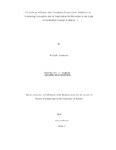A critique of Kenya Anti-Corruption Commission’s initiatives in combating corruption and its implications for education in the light of Aristotelian concept of akrasia
Abstract
The causes and effects of corruption, and how to combat it, are issues that are attracting national and international agenda. On the international scene, the formation of the UN Convention against Corruption, the African Union Convention on Preventing and Combating Corruption, the UN Convention against Transnational Organized Crime, the UN Declaration against Corruption and Bribery in International Commercial Transactions, and the International Code of Conduct for Public Officials are self-explanatory testimonies. Kenya was the first country worldwide to ratify the United Nations Convention against Corruption (UNCAC). She has also signed the African Union (AU) Convention on the Prevention and Combating of Corruption and has made considerable efforts towards vigorous enforcement of the Anti-Corruption and Economic Crimes Act, 2003 and the Public Officer's Ethics Act, 2003. A striking anti-corruption initiative is the establishment of the Kenya Anti-corruption Commission in the year 2003. This constitutional establishment of KACC as a legal body to deal with incidences of corruption is an official admission that corruption is a serious problem in Kenya. Evidently therefore, the war against corruption is now a global concern and scholarly investigations need to pay closer attention to the development of theory and advancing research into unraveling the puzzle of corruption and relevant mechanisms towards it eradication. This study investigated anti-corruption initiatives by the Kenya Anti-Corruption Commission (KACC) while seeking an educational model that could make solid contributions towards the fight against corruption. A synthesis of anti-corruption initiatives was done in light of Aristotle's concept of Akrasia and the role of education as an anti-corruption instrument analyzed in this context. In this regard, corruption was defined as the abuse of public office for private gain through misuse of the public power entrusted to an officer. Akrasia postulated as the lack of command over self in acting against one's better judgement. Better judgement has the import of choosing virtue against vice. Within the context described in the preceding paragraphs, the objectives of this study were, to critically examine various anti-corruption initiatives by the Kenya Anti-corruption Commission, to investigate how educational practice could be useful in facilitating the fight against corruption in Kenya and to attempt the development of an educational model as an interventional*}'
strategy in the fight against corruption. To achieve these objectives, the study applied the philosophical methods of inquiry, namely the Critical, the Analytical and the Speculative modes. The study found out that despite considerable efforts by the Kenya Government to combat corruption, there seems to be no significant achievements as evidenced the high number of cases reported to KACC. It was established that the Anti-Corruption and Economic Crimes Act 2003 is not comprehensive in its definition of corruption and there is poor understanding of corruption by the public which is illustrated by the nature of reports made to KACC. It was further found out that some the provisions of the act establishing KACC are in contradiction with the Constitution of Kenya which has led to its being challenged in court. The study established that human beings have a tendency to break rules that they set to govern their conduct a theorization that led to the understanding that people will still engage in corruption despite being aware of their moral obligations and the legal implications of their acts. With regard to the practice of Anti-Corruption Education, the study established that KACC has not articulated the goals of Anti-Corruption Education in Kenya, which in turn have not been internalized by educational institutions. It was established that curriculum, teaching methodology and evaluation approaches for Anti-Corruption Education have not been articulated by KACC.
On the basis of the findings, the study recommends that there should be a policy within the practice of education that integrates anti-corruption education in the curriculum at all levels of education from primary to post secondary education. There should be a policy on the methodologies used to impart and instruct Anti-corruption Education and define training standards and curriculum development. The study further recommends that The Kenya Anti-Corruption and Economic Crimes Act 2003 should be reviewed to streamline departments of KACC to give it a broader mandate with differentiated responsibilities to attain a position of self-contained entity. The concept of corruption should be redefined to clarify the mandate of KACC to all stakeholders and KACC should adopt an educational model that would equip citizens with skills that are effective in being able to know how to act and translate this knowledge into action. The study recommends further research to identify other weaknesses that may make people to act akractically so as to enhance the fight against corruption.
Collections
- MKSU Doctoral Theses [51]

